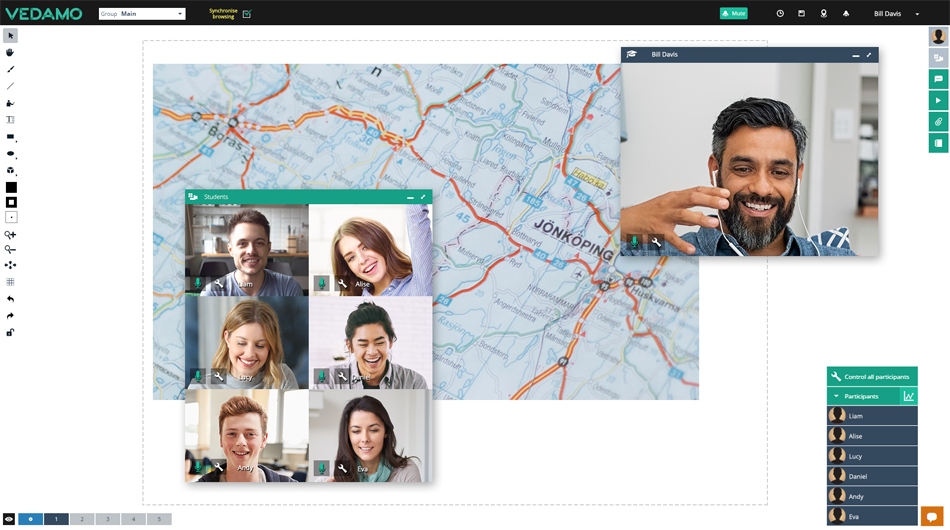Without the support and involvement of a learning community, there is no online class. Let’s see why communities are important for successful online training and how to foster connections in the virtual classroom.
Studying in a virtual classroom doesn’t have to be a lonely experience. We know how motivating and healing communities can be. But some may think that online training is more isolated and offers less of a community feel. In fact, virtual classrooms allow for new kinds of conversations and relationship building. Participating in the virtual classroom gives you an “always-available” conversation with others. Learn how to bring shared meaning and purpose to your online classes with this article.
What is a community?
The cyberculture theorist David Bell explains the evolution of the community concept. Before globalization, communities were dense clusters of physically proximate participants. Friends, family, neighbors, and colleagues were the predictable members of local communities.
However, with globalization came the erosion of these intense relationships. Groups have become disembedded and decentralized. As communities are no longer rooted in place, we are free to find like-minded individuals with shared objectives and interests on the World Wide Web. Virtual communities are networks that cross boundaries and allow people to interact and pursue mutual goals.
Is the internet the solution or a problem?

Digital sceptics like MIT professor Sherry Turkle claim that in this new postmodern situation, people are connected, but alone. Resistance to change is natural. But over time, we have reaped the benefits of online communities in both our private lives and in education. Indeed, the detachment from local static communities may be painful. On the other hand, people are more open to global spheres of interest, values, and opportunities. In the digital era we are looking for new ways to belong. The rise of social networking sites, dating platforms, and online courses shows this strong need for socialization without physical constraints.
So, yes, the internet is a solution for many.
Some reasons why:
- Virtual communities promote flexibility, effectiveness, and efficiency when it comes to learning.
- Students from distant locations create new communities that were impossible to imagine before.
- In an online class a new system of equality is created. Everyone has a chance to pose a question, to get feedback, and to be heard. There is no Mr. Smarty Pants in the front row who will upstage everyone else.
Why is community important for the virtual classroom?
The most powerful learning experience is embedded in relationships. Social aspects help to bring more meaning and passion to the study process. Research shows that learners are more motivated to participate when there is a sense of community. There are two key reasons:
- First, conversations make the study material easier to understand. Educational communities are stimulating and also nourish interest and inspiration.
- Second, when we have a feeling of belonging, we are willing to be accepted by team members. This means that students are motivated to perform well in class in order to get the approval of tutors and classmates.
How to build communities in the virtual classroom?
There is a lot you can do to foster connections among virtual members that may very well be stronger than those in face-to-face groups. Some VEDAMO Virtual Classroom features come in handy during this process:

- Be there: be accessible and available. Stories from lifelong learners with a passion for knowledge usually involve an inspiring tutor. No matter what kind of teaching style you adopt, learners should be comfortable with you. A student may feel discouraged or abandoned if you create hierarchies. Needless to say, unexpected delays in responses or feedback can disrupt the feeling of connection and create distance.
- Stimulate interaction. Promote dialogue, collaboration, and critical thinking by inviting students to actively engage in the learning process. Make it clear that everyone can participate by using the Raise Hand button.
- Make your lessons participant driven. Knowledge is not just delivered by the expert (you). It is jointly constructed by the members of the learning community. The successful virtual classroom is certainly not the one where the instructor posts lectures and controls and dominates the process. Let go of old teaching models. Make use of technological advancements such as interactive online whiteboards and screen sharing.
- Facilitate subgroups. Breakout rooms allow you to easily split a class into smaller groups. Subgroups are flexible and more intimate. They encourage learning not only from the teacher, but also from classmates.
- Agree on netiquette. Group norms are not just niceties of behavior. Netiquette represents shared practices that bring members together. Talk with your class about the do’s and don’ts of communication. Mutually accepted norms are that social glue that keep members safe and create a feeling of shared values.

Final notes
Clearly, an online class is not a one-man show. Your role as an instructor is to set the stage for an inspirational and enriching experience. To make the magic happen, tutors are also responsible for encouraging community building. The importance of virtual communities is somewhat overlooked by traditional methods of pedagogy. However, most of your students are probably digital natives. For them, online platforms are the natural settings for creating relationships and a sense of belonging. Making the most of ethical and active connections in class can truly differentiate the lectures you deliver.
